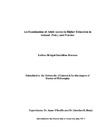| dc.description.abstract | The rationale for this study is to examine the under-researched relationship between national policy and higher education practice in relation to contemporary access initiatives for adult learners in Ireland. This study involves researching the theme of adult access provision in four diverse third-level providers in Ireland and will examine institutional responses, as well as student perspectives, on national access policies and aims to answer the following overarching research question, given the nature of higher education, why and in what way do Irish higher education institutions provide access for adult learners and, to what extent, if any, has such access made an impact on the working practices and values of higher education professionals? The research findings in this study will make a contribution to the field of access to higher education for adults in an Irish context, where there is a dearth of literature.
The literature draws mainly from the area of the politics of education, evaluative studies on higher education and access. Key policy documents at national, supra-national and international levels were also reviewed. From this review, two divergent models of higher education organisations were identified: the traditional collegial model, which focuses on the endogenous environment, and the new public management (NPM) model, which is more exogenously driven. Access is one of the areas within higher education that is at the nexus of this theoretical debate. One overarching theoretical model which provides a way of conceptualising adult access initiatives within the complex endogenous and exogenous higher education landscape is Complex Adaptive Systems (CAS). This study draws on CAS as an analytical framework.
In terms of methodology, this study adopts a mainly qualitative approach in the constructivist and interpretivist epistemological tradition, using a mixed methods case study approach. As part of the study, fieldwork involving a sample of 77 participants was undertaken. Selected using purposive sampling, 37 semi-structured interviews with staff and institutional managers were conducted and 40 students participated in eight focus groups with an average of five participants across four diverse higher education institutions in Ireland. A number of additional qualitative and quantitative data collection methods were used, including institutional documentation review.
Key findings focus on the significant impact of government policies on access and show that there has been change in many areas of practice at meso level and also, as a consequence, at micro level. Specifically, all institutions have engaged in extensive environmental planning and have developed a wide range of organisational policies, processes and structures for the implementation of adult access. In addition, all institutions have responded to national policy recommendations by either adapting, or re-structuring, existing curricula and learning opportunities locally for greater adult access and a range of new partnerships have evolved. These findings suggest that adult access initiatives have resulted in a degree of change at the level of the institution, although there was also some evidence of continuity of existing practices. | en_US |


